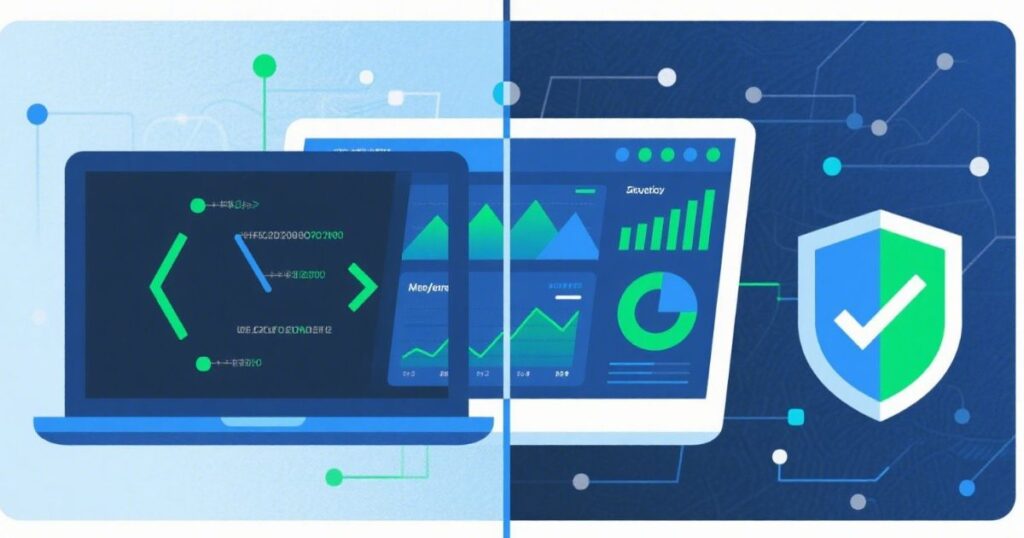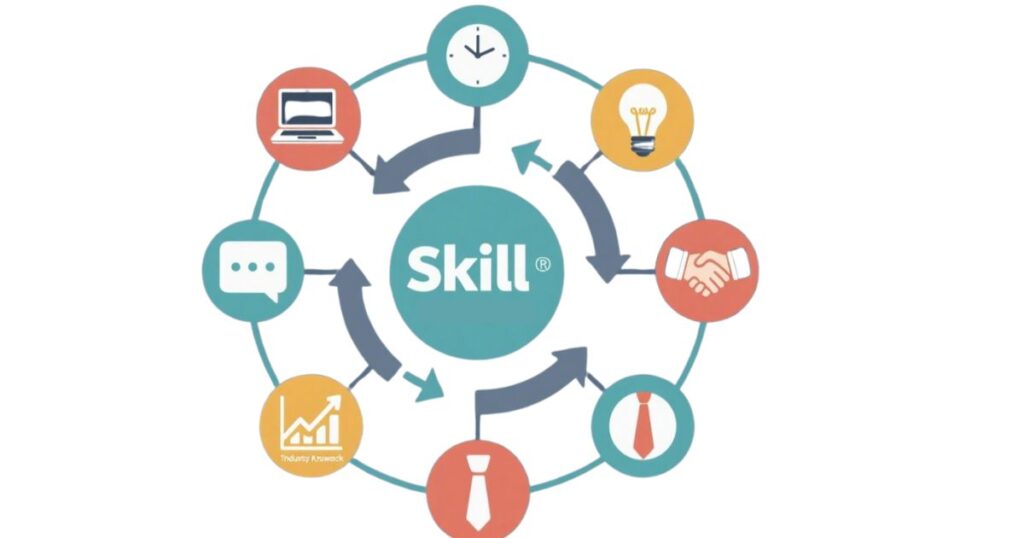Securing an internship in 2025 requires more than just academic qualifications. Today’s competitive job market demands specific skills that help you stand out from thousands of applicants.
The professional world has changed dramatically since 2020. Remote work became standard practice across industries. Technology advancement accelerated at breakneck speed. Companies now expect interns to bring value from day one.
Whether you’re pursuing a cybersecurity internship, virtual internship, or data analyst internship, certain skills remain universally important. These eight essential skills will prepare you for success in any internship role.
Your preparation today determines your performance tomorrow. Let’s explore what it takes to excel in your chosen field.
1. Technical Proficiency: The Foundation for Your Internship
Technical skills form the backbone of modern internships. Every industry now relies heavily on technology and digital tools. Your ability to navigate these systems directly impacts your contribution to the team.

Software engineer internship positions require proficiency in programming languages like Python, JavaScript, or Java. Companies expect you to understand basic coding principles before you arrive. You should practice version control systems like Git and familiarize yourself with development environments.
Data science internship roles demand knowledge of statistical software and programming tools. R and Python are essential for data analysis tasks. SQL database management skills help you extract and manipulate information effectively. Understanding machine learning concepts gives you a competitive edge.
Cybersecurity internships require foundational knowledge of network security principles. You should understand common threats like malware, phishing, and social engineering attacks. Familiarity with security tools and frameworks demonstrates your commitment to the field.
Don’t wait until your first day to learn these technical skills. Start building your knowledge base now through online courses and practice projects. Create a portfolio showcasing your technical abilities to potential employers.
2. Adaptability in a Virtual Internship Landscape
The shift toward remote work has made adaptability a crucial skill for success. Virtual internship opportunities now outnumber traditional in-person positions across many industries. Your ability to thrive in digital environments determines your career prospects.
Remote internships require different strategies than office-based roles. You must manage your workspace, maintain professional communication, and stay motivated without direct supervision. These challenges test your flexibility and resilience.

Forage virtual internship programs simulate real work environments through online platforms. These experiences teach you to collaborate with team members across different time zones. You learn to use digital tools for project management and communication.
Technology becomes your primary interface with colleagues and supervisors. Video conferencing, instant messaging, and cloud-based collaboration tools replace face-to-face interactions. Your comfort level with these platforms affects your daily performance.
Adaptability also means embracing change when processes or requirements shift unexpectedly. Companies value interns who can pivot quickly and maintain productivity during transitions. Practice working in different environments to build this flexibility.
3. Effective Communication Skills: Your Gateway to Success
Communication skills separate good interns from great ones. Your ability to express ideas clearly and listen actively impacts every aspect of your internship experience. Strong communicators build better relationships and achieve superior results.
Written communication skills are particularly important for internships for students in today’s digital workplace. You’ll send emails, write reports, and contribute to documentation projects. Clear, concise writing helps you convey complex information effectively.
Verbal communication matters equally in video calls and phone conferences. UN internships often involve presenting findings to diverse audiences. Your ability to explain technical concepts in simple terms demonstrates professional maturity.
Active listening skills help you understand instructions, feedback, and expectations accurately. Pay attention to both verbal and non-verbal cues during conversations. Ask clarifying questions when something isn’t clear.
Cultural sensitivity becomes important when working with international organizations or diverse teams. Different communication styles and expectations exist across cultures. Adapt your approach while maintaining your authentic voice.
Practice public speaking through presentations and group discussions. Join clubs or organizations that provide opportunities to develop these skills. Record yourself speaking to identify areas for improvement.
4. Problem-Solving and Critical Thinking
Problem-solving skills distinguish exceptional interns from average performers. Every workplace faces challenges that require creative solutions and analytical thinking. Your ability to tackle problems systematically adds value to any organization.
Data analyst internship positions present complex datasets that require careful analysis. You must identify patterns, spot anomalies, and draw meaningful conclusions from raw information. Critical thinking helps you ask the right questions and validate your findings.
Digital marketing internship roles involve optimizing campaigns and improving performance metrics. You’ll analyze customer behavior, test different strategies, and measure results. Problem-solving skills help you identify why campaigns succeed or fail.
Develop a structured approach to problem-solving that you can apply consistently. Start by clearly defining the problem and gathering relevant information. Generate multiple potential solutions before selecting the best option.
Practice breaking down complex problems into smaller, manageable components. This approach makes overwhelming challenges feel more approachable. It also helps you identify which aspects require immediate attention.
Learn to think critically about information sources and data quality. Question assumptions and verify facts before concluding. This skeptical mindset protects you from making decisions based on incomplete or inaccurate information.
5. Time Management and Self-Discipline for Remote Interns
Time management skills become even more important in remote work environments. Without direct supervision, you must organize your schedule and prioritize tasks effectively. Self-discipline determines whether you meet deadlines and maintain productivity.
UNICEF internship programs often involve managing multiple projects simultaneously. You need systems for tracking progress, setting priorities, and allocating time appropriately. Poor time management leads to missed deadlines and stressed relationships.
Law internships require meticulous attention to detail and strict deadline adherence. Legal work involves time-sensitive documents and court filings. Your ability to manage competing priorities directly impacts case outcomes.
Create a daily schedule that includes both work tasks and personal activities. Set specific times for checking emails, attending meetings, and completing project work. Stick to these boundaries to maintain work-life balance.
Use productivity tools and techniques to stay organized. Project management software, calendar apps, and task lists help you track responsibilities. Find systems that work for your learning style and preferences.
Eliminate distractions during focused work periods. Turn off social media notifications, find a quiet workspace, and communicate your availability to family members. These boundaries protect your productivity and professional reputation.
Read Also: Why the Mandela Rhodes Scholarship Is More Than Just Funding
6. Collaborative Mindset: Working in Teams
Collaboration skills are essential for success in any internship environment. Most projects require teamwork, whether you’re working in person or remotely. Your ability to contribute effectively to group efforts determines your impact.
Google internships famously emphasize collaborative problem-solving and team-based projects. Interns work alongside experienced professionals on real business challenges. Your success depends on building relationships and contributing to shared goals.
Internship for students programs teach you to work with people from different backgrounds and experience levels. You’ll collaborate with fellow interns, full-time employees, and external partners. Each relationship requires different communication styles and approaches.
Practice giving and receiving feedback constructively. Effective team members help others improve while remaining open to suggestions. This two-way communication builds trust and improves overall performance.
Learn to compromise and find win-win solutions when conflicts arise. Disagreements are normal in collaborative environments. Your ability to navigate these situations professionally demonstrates maturity and leadership potential.
Contribute your unique perspective while respecting others’ viewpoints. Diverse teams produce better results when all members feel valued and heard. Share your ideas confidently while remaining open to different approaches.
7. Industry Knowledge: Staying Ahead of Trends
Industry knowledge demonstrates your commitment to the field and helps you contribute meaningfully from day one. Staying current with trends, regulations, and best practices shows employers you’re serious about your career path.
Accounting internships require an understanding of current financial regulations and reporting standards. Tax laws change frequently, and new accounting software emerges regularly. Your knowledge of these developments makes you a valuable team member.
Cybersecurity internships demand awareness of evolving threats and security technologies. Hackers develop new attack methods constantly. Your understanding of current vulnerabilities and protection strategies helps organizations stay secure.
Follow industry publications, podcasts, and thought leaders on social media. Set aside time each week to read about developments in your field. This habit keeps you informed and provides conversation topics during networking events.
Attend virtual conferences, webinars, and professional association meetings. These events provide insights into industry trends and networking opportunities. Many organizations offer student discounts or free access to educational content.
Join professional associations related to your field of interest. These organizations provide resources, networking opportunities, and career guidance. Student memberships often include access to exclusive content and mentorship programs.
8. Professionalism and Workplace Etiquette
Professionalism encompasses your behavior, appearance, and attitude in work settings. These soft skills often determine whether you receive job offers and positive references. Strong professional presence sets you apart from other candidates.
Software engineer internship environments may seem casual, but professionalism remains important. Your reliability, punctuality, and respectful communication create positive impressions. These qualities matter more than technical skills in many situations.
Internship for students programs provide opportunities to practice professional behaviors in low-stakes environments. You can learn workplace norms and expectations while receiving guidance from mentors. These experiences prepare you for full-time employment.
Dress appropriately for your work environment, whether virtual or in-person. Research company culture and expectations before your first day. When in doubt, err on the side of being more formal rather than too casual.
Maintain professional email and social media presence. Employers often review online profiles during hiring processes. Clean up inappropriate content and highlight your professional achievements and interests.
Practice proper meeting etiquette for both in-person and virtual settings. Arrive on time, come prepared, and participate actively. Follow up on commitments and communicate proactively about challenges or delays.

Conclusion: Preparing for Your Dream Internship
These eight skills form the foundation for internship success in 2025. Technical proficiency opens doors, while soft skills determine your long-term career trajectory. Start developing these abilities now, before you apply for positions.
Remember that skill development is an ongoing process. Continue learning and growing throughout your internship experience. Seek feedback from supervisors and colleagues to identify areas for improvement.
Your preparation today determines your success tomorrow. Invest time in building these essential skills now. They will serve you well throughout your career, not just during your internship.
Ready to start your internship search? Create profiles on platforms like LinkedIn, Indeed, and company career pages. Customize your applications for each position, highlighting relevant skills and experiences.
Network with professionals in your field through informational interviews and industry events. These connections often lead to internship opportunities and valuable career advice. Your next great opportunity might be just one conversation away.

